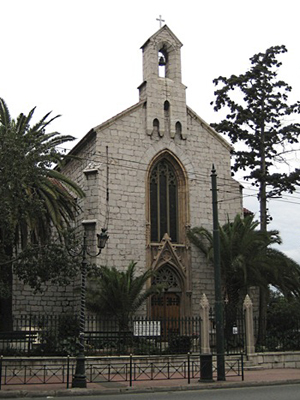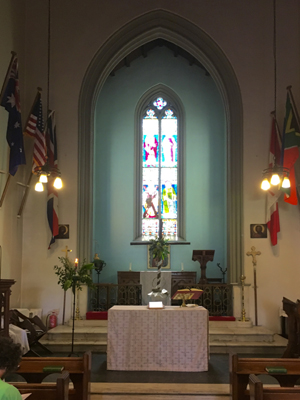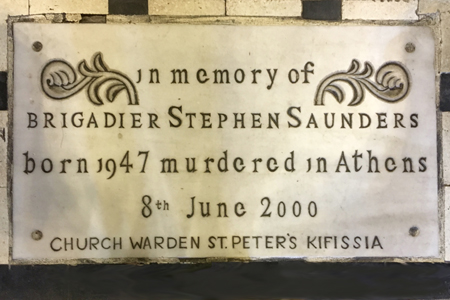| |
 |
 |
 |
| Comment on this report, or find other reports. |
 |
| Our Mystery Worshippers are volunteers who warm church pews for us around the world. If you'd like to become a Mystery Worshipper, start here. |
 |
| Find out how to reproduce this report in your church magazine or website. |
|
|
| 3174: St Paul's, Athens, Greece |
 |

Photo:
© Mark Notaras and used under license
|
 |
Mystery Worshipper: Columba's Currach.
The church: St Paul's, Athens, Greece.
Denomination: Church of England, Diocese in Europe.
The building: The present building was consecrated as an Anglican church by the Bishop of Gibraltar in 1843. Built in the early English Gothic style, it looks very much like village churches around England and thoroughly unlike most churches in Greece.
The interior contains several memorials to dead Englishmen, most of them officers in the Army and Royal Air Force. The crossing was decorated with numerous flags, including the flag of Greece and those of the UK, the USA, Canada, Australia, New Zealand, and South Africa.
The church: The Greek constitution states that freedom of religious conscience is inviolable, but until recently only Greek Orthodoxy, the Jewish community, and the Muslim community of Thrace were recognised as "religious entities." Thus, St Paul's had to be construed as being part of the British embassy in order to exist. But in 2014 Parliament passed a law bestowing the status of religious entity upon the Roman Catholic Church, the Church of England, certain evangelical Christian churches, and certain other Orthodox churches, and so St Paul's is no longer formally attached to the embassy. The primary mission of St Paul's has always been, and still is, to minister to British and other Anglophone residents in Athens. This takes many forms. Perhaps one of the most important involves funerals, as the customs and laws in Greece are very different from those in the UK, and St Paul's website includes instructions on topics such as how to arrange for repatriation of a body and how to go about obtaining cremation (as there are no crematoria in Greece). On a more day-to-day level, I saw that their notice board included a list of places where one could watch English-language TV live! They also support several organisations that are sponsored by the Orthodox Church, such as Hestia, a hostel for refugees who are unaccompanied minors, and the Maria Kokkori Foundation, a residence for those with Down Syndrome. They have sung eucharist and Sunday school each Sunday, and a weekday holy communion on Wednesdays. Baptisms, confirmation and marriages are arranged by request.
The neighbourhood: St Paul's has an enviable location in a very posh bit of central Athens, across the street from the National Garden. It seems to be a neighbourhood popular with religious minorities, as St Paul's is located between the Russian Orthodox church and the First Greek Evangelical Church (which is of the Presbyterian polity). The Acropolis is nearby, and about a 15 minute walk away is the Areopagus, where St Paul spoke of the nature of God (Acts 17:16-34).
The cast: The Revd Canon Malcolm Bradshaw, senior chaplain, celebrated and preached.
The date & time: Sunday, 21 May 2017, 10.15am (allegedly – the service actually began just after 10.20).
What was the name of the service?
Sung Eucharist.
How full was the building?
I estimated that there were around 35-40 in the congregation, plus about a dozen in the choir and three in the altar party. It's a fairly small building, so it felt comfortably full.
Did anyone welcome you personally?
Yes, several times. Before entering, I was greeted by two women who were chatting outside. Then I was more formally greeted by a woman whose badge identified her as churchwarden. I happened to be entering at the same time as Canon Bradshaw, and he said hello as well. Our mutual arrival was serendipitous, but I noted that he circulated just before the service to greet all of the other visitors, of whom there were many.
Was your pew comfortable?
It was perfectly fine when sitting. There wasn't really enough room to kneel, but we didn't do very much of that.
How would you describe the pre-service
atmosphere?
Rather bizarrely, the choir were practicing a gospel version of the Beatles' song "Help," accompanied by a rather tiny electric keyboard. Neither the song nor the keyboard featured in the service, for which I was quite grateful. There was a fair amount of chatter amongst the congregants, but it was reasonably quiet.
What were the exact opening words of the
service?
"We begin our worship by singing our opening chant, 'Christ is risen.'" This was followed by the said chant (not a plainsong introit, but something more akin to a Taizé chant), a welcome from the chaplain, and a hymn.
What books did the congregation use during the
service?
The New English Hymnal and two leaflets referred to as the "broad sheet" and the "long sheet." The first of these contained the readings, the numbers of the traditional hymns, and the words to two modern hymns, as well as a commentary on each reading (a new one to me, I must say, but a welcome one). The long sheet contained the order of service, which was taken from Common Worship, Order One in Contemporary Language.
What musical instruments were played?
A small pipe organ, said to be the first of its kind anywhere in Greece.
Did anything distract you?
The diversity of the congregation was a pleasant distraction. There was a mixture of older, well-groomed, and rather conservative-looking people, a few people who seemed to be aging hippies, and some casually-dressed young tourists. About one-third were young African families. But perhaps the biggest distraction came from myself: after a month of traveling in Orthodox countries, I caught myself making the sign of the cross in the Eastern fashion!

Was the worship stiff-upper-lip, happy clappy, or
what?
I suppose it was "broad church," being a bit of a mixture. Central churchmanship or "middle of the road" Anglicanism doesn't really exist anymore, but I think that's what they were aiming for.
The celebrant wore a chasuble, the lector a cassock and surplice, the server a cassock-alb, and the choir crimson robes. The epistle and gospel were read in cut-glass English accents, but the first lesson, from Acts, was read in what I think was a Nigerian accent. There were no bells nor any incense, although the latter was mentioned in one of the hymns!
The basic text was Common Worship Eucharist, but wherever there was a choice, they seemed to go with the option that allowed the most room for a theologically liberal interpretation. However, to this basic structure were appended bits that seemed designed to appeal to different demographics. The music included two modern hymns (although they were definitely hymns, and not worship songs), some old warhorses of Anglican hymnody, and one hymn suggesting a Catholic understanding of the eucharist. Some might call this mixture incoherent. I would call it Anglican.
Exactly how long was the sermon?
15 minutes.
On a scale of 1-10, how good was the preacher?
7 – Canon Bradshaw is a gifted public speaker with a sonorous voice and a manner that is expressive without being overly theatrical. He spoke from notes but didn't seem to refer to them very often. However, I'm not entirely sure I always followed his line of thought.
I noted that nothing in the sermon would have been objectionable to one who viewed Christ as a moral teacher but not the incarnate Second Person of the Trinity. I wondered if that was deliberate.
In a nutshell, what was the sermon
about?
Everyone has a world view. We see this in our politic. For communists and others of a dogmatically leftist persuasion, the answer will always be more government intervention. For those of the libertarian right, the answer will always be less government intervention. The two cannot be reconciled, because each makes sense according to its own logic. Religions are also world views. Jesus, though, challenged his disciples and challenges us to step out of our world view and into one based on his vocation of love and communion with the Father.
Which part of the service was like being in
heaven?
I admired the way that the community managed to be a little corner of England whilst at the same time being clearly outward-looking, diverse, generous and welcoming. At the end of the service, we exchanged the Paschal greeting in both English and Greek. Also too good not to mention: A woman got up to say that a recent fund drive had raised "300 pounds." The chaplain gently corrected her, saying, "I think she means Euros." There was a great deal of laughter from the congregation (including the woman in question), as everyone seemed to realise that this was almost a parody of the sort of thing that might happen in the Church of England outside of England.
And which part was like being in... er... the other place?
I have never understood why some Anglican clergymen insist on giving a running commentary for the liturgy. Some instruction may be useful, but there is almost never any need for comments like "The service continues on page seven of your long leaflet; that's page seven of your long leaflet." Similarly, if the readings are written out in their entirety, complete with citations to chapter and verse, it is not necessary to give a prolix version of the same citation aloud.
What happened when you hung around after the service looking lost?
On the way out, the chaplain was greeting people, but there was a substantial and very slow queue, so I spotted the coffee and went there instead.
How would you describe the after-service
coffee?
Refreshments were served in a pleasant garden. The coffee was a well-known instant brand for which I do not care. I asked if there was any tea, and got the response, "Of course! Most of us are English, after all." There were also biscuits and some rather superior sandwiches.
How would you feel about making this church your regular (where 10 = ecstatic, 0 = terminal)?
8 – My own tastes run to a higher and more traditional type of Anglicanism, but if I lived in Athens, I'd go here. The community seems quite lovely.

Did the service make you feel glad to be a
Christian?
Yes, and glad to be an Anglican.
What one thing will you remember about all this in seven days' time?
The idea of a parish fete in Athens, even if it raises money in Euros rather than pounds. |
|
|
 |
 |
 |
| We rely on voluntary donations to stay online. If you're a regular visitor to Ship of Fools, please consider supporting us. |
 |
 |
 |
| The Mystery Pilgrim |
 |
| One of our most seasoned reporters makes the Camino pilgrimage to Santiago de Compostela in Spain. Read here. |
 |
 |
 |
| London churches |
 |
| Read reports from 70 London churches, visited by a small army of Mystery Worshippers on one single Sunday. Read here. |
| |
|
|
|
|


